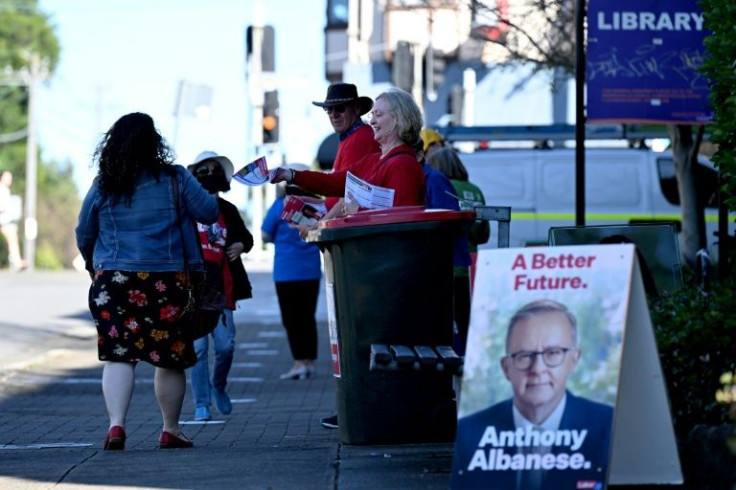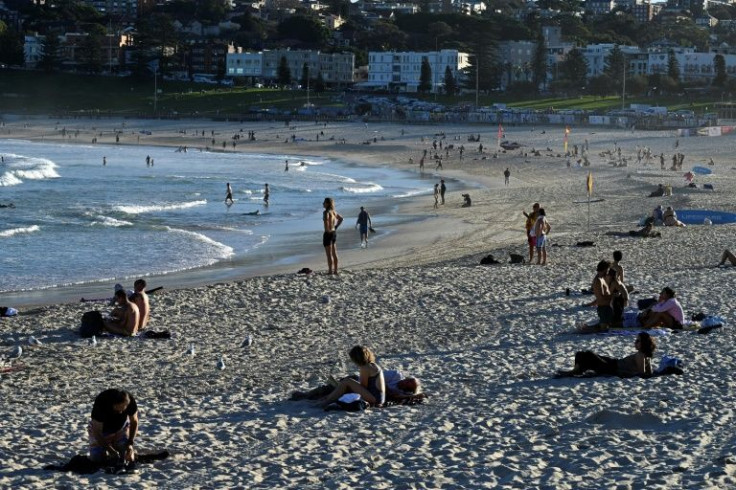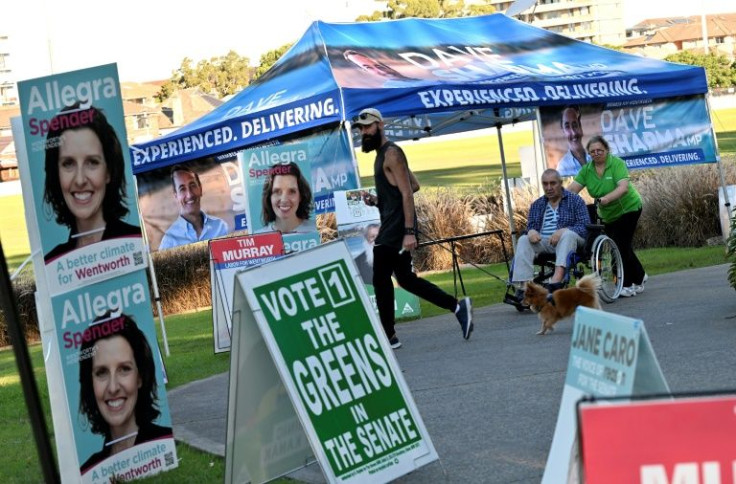Conservatives Tipped To Lose In Australian Nail-biter Election
Australians punch drunk after three crisis-ridden years of fire, flood and plague will go to the polls on Saturday, in a tight race narrowly tipped to end a decade of conservative rule.
Opinion polls have consistently shown centre-left Labor ahead, suggesting a government led by veteran party lawmaker Anthony Albanese that would be more climate-friendly and less antagonistic toward China.
But pugilistic Prime Minister Scott Morrison, who leads a conservative coalition, appears to be rapidly closing the gap as election day approaches.
The often-acrimonious campaign has been marked by fears about soaring prices, divisions over Morrison's leadership and anxiousness about tougher days to come.
The last three years have seen Australia's once-envied way of life upended by back-to-back bushfires, droughts, the Covid-19 pandemic and several "once-in-a-century" floods.
Australians -- usually some of the world's most optimistic voters -- have grown markedly more dissatisfied with their lives, more pessimistic about their future and more turned off by traditional political parties, according to polling by Ipsos.

For many Aussies, their unofficial mantra of gung-ho optimism -- "she'll be right" -- suddenly seems a bit wrong.
"It has been a very difficult period for the country," said Mark Kenny, a professor at the Australian National University.
"There's a fair bit of dissatisfaction with this government, and the prime minister's standing has been called into question quite a lot."
Surveys show the malaise is pronounced among women and younger voters, who face the prospect of being poorer than their parents while inheriting a country at the pointy end of climate change and located in an increasingly tough neighbourhood.
Just over 17 million Australians are registered to go to the polls on Saturday, electing 151 representatives to the lower house and just over half the members of the Senate.

Voting is compulsory and voters rank the candidates in order of preference, adding extra layers of unpredictability to the outcome.
Fifty-four-year-old Morrison is hoping for a repeat of his 2019 "miracle" come-from-behind election victory. But he will have to overcome the collective trauma of the last three years.
Within months of his shock victory, the "Black Summer" bushfires would cut through the east of the country, burning an area the size of Finland and choking Brisbane, Sydney and Melbourne in a miasma of acrid smoke for weeks on end.
Morrison's decision to take a family holiday to Hawaii in the middle of the crisis was widely pilloried, as was his downplaying of the affair by saying "I don't hold a hose, mate."
No sooner had the fires ended than the Covid-19 pandemic began.
Morrison's popularity initially surged as Australians watched the horrors unfolding in China, Italy and elsewhere from a state of Covid-free normalcy on Bondi and other beaches.
The turning point was the lengthy delay in rolling out vaccines, despite Morrison's promises that Australia was at the "front of the queue", said Ben Raue of The Tally Room, a popular political blog.

The delay prolonged lockdowns in major cities and a two-year-long border closure -- splitting families and gaining Australia a reputation for being a "hermit state" isolated from the rest of the world.
"That was the point when Morrison went from being a little bit behind, to being quite a long way behind" in the polls, said Raue.
"They've never really recovered since then. They've had some better polls and some worse polls, but they've pretty much never been ahead."
Albanese, a 59-year-old veteran Labor lawmaker, has tried to make the election a referendum on Morrison's performance.
His own "small target" campaign has given Morrison and Australia's partisan media few policies to shoot at, but also left voters guessing at what an Albanese-led government might bring.
The contest has been rough and tumble, highly personal and at times bordering on juvenile.
The Liberal party has splashed adverts claiming "it won't be easy with Albanese", and has repeatedly suggested he is dangerous and a "loose unit" on the economy.
Labor has hit back, imploring Australians to "fire the liar".
Around a third of voters are expected to look beyond traditional left and right parties as their first preference.
They can choose from an array of populists, the far-right and centrist independent candidates angered by the Liberals' pro-coal stance on climate.
"There's an absolute sense that Liberal voters who sit near the centre, who are perhaps economic conservatives and social progressives, that they've been left in the wilderness," Zoe Daniel, an independent candidate challenging one Melbourne constituency, told AFP.
In the latter stages of the campaign, the focus has turned to the soaring cost of living in what was already one of the world's most expensive places to live.
Despite presiding over a record deficit, the first recession in a generation and sclerotic wage growth, Morrison's ability to reinvent his image and reframe the debate has kept his party well within touching distance.
One poll commissioned by The Sydney Morning Herald on Wednesday predicted a Labor win, but put his re-election within the margin of error.
There is a perception Morrison's attacks on Albanese's "dangerous" economic plan may be starting to stick.
"I think there's a sense of change in this country. The question is, has the opposition done enough to convince people that change is a safe option?" said Kenny.
© Copyright AFP {{Year}}. All rights reserved.





















